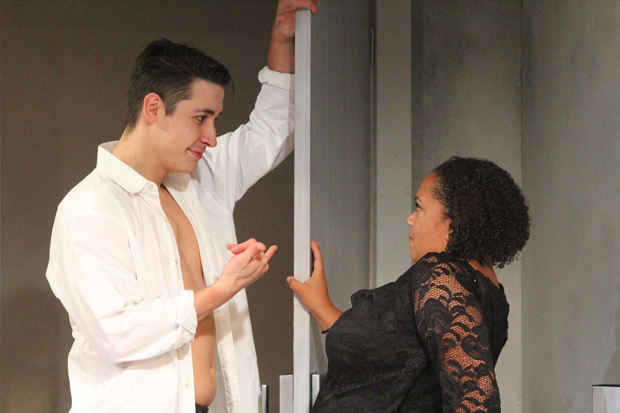Lives Intersect and Tragedy Unfolds in Zürich
Amelia Roper’s play comes to Chicago after premiering off-Broadway this past spring.

(© Gregg Gilman)
Amelia Roper's Zürich, now playing at Steep Theatre, is a series of vignettes taking place in identical rooms on the 40th floor of a stylish Swiss hotel. Some of the hotel's guests are in town for business, some for pleasure. Most of them are American, and none of them are happy. It soon becomes apparent that the slice-of-life scenes are unfolding simultaneously, or nearly so. Thanks to some canny sound cues by Thomas Dixon, noises carry from one room to another, and the events of each room become a piece of a larger puzzle that can only be put together once you've seen all the scenes.
Despite initial promise in the opening scene, thanks to tightly crafted wordplay between a mysterious traveler (Sasha Smith) and her bratty one-night stand (Jeff Kurysz), Zürich is sadly uneven and lacks momentum. The interlocking timeline is a clever construct, but it doesn't quite hold up to scrutiny. Unless the Maid (played with depth and melancholy by Elizabeth Wigley) has the power to dilate time, the pieces don't quite fit together perfectly. Little discrepancies wouldn't be noticeable, though, if what was happening onstage were more compelling.
Overall, the actors acquit themselves capably when they are given enough to work with. Roper's dialogue is clever, but her characters are not given the depth their stories demand. They're all alienated, anguished, or traumatized, but with little indication why. Valerie Gorman in particular is underserved by Roper's script. Gorman plays One, an embittered senior citizen seeking social retribution, along with Two (Brandon Rivera), her caretaker, whom she has radicalized. Gorman and Rivera work hard onstage to sell their righteous fury, but without support from the script, they ultimately fall short. In a delightful surprise, the most authentic and exciting scene in the play occurs between young actors Maya Lou Hlava and Cole Keriazakos, playing two preteens left to their own devices while their parents fight by the pool.
The hotel set is on trend, designed by Jeffrey D. Kmiec with modern minimalist grays, whites, and blond wood fixtures, finished off with floor-to-ceiling plate glass separating the audience and the action. The glass enclosure looks sleek, but it has the unfortunate side effect of removing intimacy. However, Kmeic and sound designer Dixon should both be praised for skillfully avoiding any auditory issues that could be expected from a play performed in a fishbowl. Transitions between scenes are accompanied by a throbbing light show by lighting designer Becca Jeffords, effectively foreshadowing the play's violent ending.
Under the ambitious direction of Brad DeFabo Akin, the cast and creative team have done fine work with Zürich. Unfortunately, Roper has not fully explored the pain behind the characters, and as a result, the play feels hollow.








